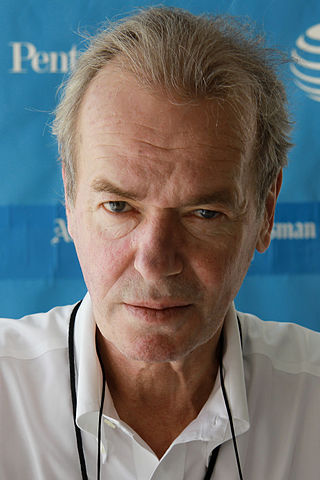
The sagas of Icelanders, also known as family sagas, are a subgenre, or text group, of Icelandic sagas. They are prose narratives primarily based on historical events that mostly took place in Iceland in the ninth, tenth, and early eleventh centuries, during the so-called Saga Age. They were written in Old Icelandic, a western dialect of Old Norse. They are the best-known specimens of Icelandic literature.

Sir Martin Louis Amis was an English novelist, essayist, memoirist, screenwriter and critic. He is best known for his novels Money (1984) and London Fields (1989). He received the James Tait Black Memorial Prize for his memoir Experience and was twice listed for the Booker Prize. Amis was a professor of creative writing at the University of Manchester's Centre for New Writing from 2007 until 2011. In 2008, The Times named him one of the 50 greatest British writers since 1945.

William Woodard Self is an English writer, journalist, political commentator and broadcaster. He has written 11 novels, five collections of shorter fiction, three novellas and nine collections of non-fiction writing. Self is currently Professor of Modern Thought at Brunel University London, where he teaches psychogeography.

The Aga Range Cooker is a Swedish range cooker. Invented and initially produced in Sweden, since 1957 most production has been located in the UK. In 2015, the British AGA Cooker manufacturing company, AGA Rangemaster Group, was acquired by the American corporation Middleby.

The English novel is an important part of English literature. This article mainly concerns novels, written in English, by novelists who were born or have spent a significant part of their lives in England, Scotland, Wales, or Northern Ireland. However, given the nature of the subject, this guideline has been applied with common sense, and reference is made to novels in other languages or novelists who are not primarily British, where appropriate.
British literature is from the United Kingdom of Great Britain and Northern Ireland, the Isle of Man, and the Channel Islands. This article covers British literature in the English language. Anglo-Saxon literature is included, and there is some discussion of Latin and Anglo-Norman literature, where literature in these languages relate to the early development of the English language and literature. There is also some brief discussion of major figures who wrote in Scots, but the main discussion is in the various Scottish literature articles.
Sagas are prose stories and histories, composed in Iceland and to a lesser extent elsewhere in Scandinavia.

Penelope Mary Fitzgerald was a Booker Prize-winning novelist, poet, essayist and biographer from Lincoln, England. In 2008 The Times listed her among "the 50 greatest British writers since 1945". The Observer in 2012 placed her final novel, The Blue Flower, among "the ten best historical novels". A.S. Byatt called her, "Jane Austen’s nearest heir for precision and invention."
John Andrew Sutherland is a British academic, newspaper columnist and author. He is Emeritus Lord Northcliffe Professor of Modern English Literature at University College London.

Joanna Trollope is an English writer. She has also written under the pseudonym of Caroline Harvey. Her novel Parson Harding's Daughter won in 1980 the Romantic Novel of the Year Award by the Romantic Novelists' Association.
A book series is a sequence of books having certain characteristics in common that are formally identified together as a group. Book series can be organized in different ways, such as written by the same author, or marketed as a group by their publisher.

Terence Blacker is an English songwriter, author and columnist.

Literary fiction, mainstream fiction, non-genre fiction, serious fiction, high literature, artistic literature, and sometimes just literature, are labels that, in the book trade, refer to market novels that do not fit neatly into an established genre or, otherwise, refer to novels that are character-driven rather than plot-driven, examine the human condition, use language in an experimental or poetic fashion, or are simply considered serious art.

Philip Blake Morrison FRSL is an English poet and author who has published in a wide range of fiction and non-fiction genres. His greatest success came with the publication of his memoirs And When Did You Last See Your Father? (1993), which won the J. R. Ackerley Prize for Autobiography. He has also written a study of the murder of James Bulger, As If. Since 2003, Morrison has been Professor of Creative and Life Writing at Goldsmiths College, University of London. He is a Fellow of the Royal Society of Literature.
The sensation novel, also sensation fiction, was a literary genre of fiction that achieved peak popularity in Great Britain in between the early 1860s and mid to late 1890s, centering taboo material shocking to its readers as a means of musing on contemporary social anxieties.
Linda Grant is an English novelist and journalist.
Oludiran "Diran" Adebayo FRSL is a British novelist, cultural critic and academic best known for his 1996 novel Some Kind of Black.
The Geoffrey Faber Memorial Prize is a British literary prize established in 1963 in tribute to Geoffrey Faber, founder and first Chairman of the publisher Faber & Faber. It recognises a single volume of poetry or fiction by a United Kingdom, Irish or Commonwealth author under 40 years of age on the date of publication, and is in alternating years awarded to poetry and fiction.

Rachel Ray is an 1863 novel by Anthony Trollope. It recounts the story of a young woman who is forced to give up her fiancé because of baseless suspicions directed toward him by the members of her community, including her sister and the pastors of the two churches attended by her sister and mother.

The literary tradition of Birmingham originally grew out of the culture of religious puritanism that developed in the town in the 16th and 17th centuries. Birmingham's location away from established centres of power, its dynamic merchant-based economy and its weak aristocracy gave it a reputation as a place where loyalty to the established power structures of church and feudal state were weak, and saw it emerge as a haven for free-thinkers and radicals, encouraging the birth of a vibrant culture of writing, printing and publishing.